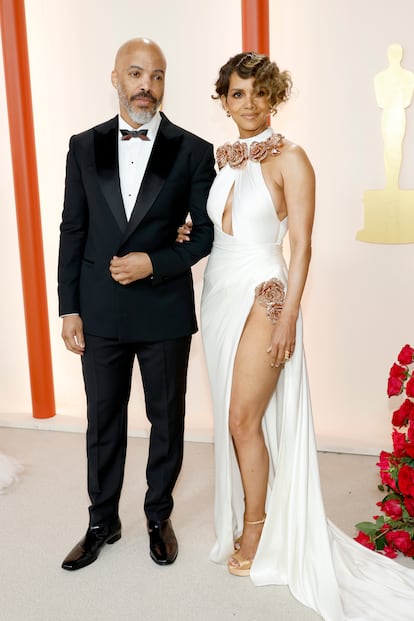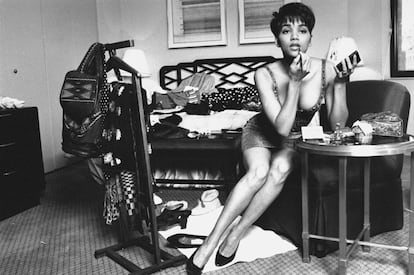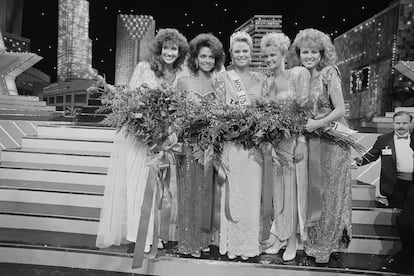Farewell to the ‘Halle Berry effect’: Actress who made Oscars history stages comeback after two decades in the wilderness
The first Black performer to win the statuette for Best Actress stars as an action heroine in Netflix hit ‘The Union’ at the age of 58, turning around a career that seemed doomed to oblivion

The specialized press was so enraptured by her that they used her name to coin a new type of cinematic curse. The so-called ‘Halle Berry effect’ refers to all those performers who, after winning an Oscar, sign on for projects of such dubious artistic and/or commercial value that they end up throwing away the credit garnered by the statuette in just a few months. Hilary Swank, Forest Whitaker, Angelina Jolie... the list is long. Berry herself was never forgiven. After breaking a historic glass ceiling by becoming the first Black performer to win the Oscar for Best Actress for Monster’s Ball (2001), she gambled by continuing her career with two films that were savaged by critics: the psychological thriller Gothika, and Catwoman, widely regarded as one of the worst superhero movies ever made. The reactions were so negative that it could have buried her career permanently, but Berry, “being a Black woman, I’m used to carrying negativity on my back, fighting, being a fish swimming upstream by myself,” as she said after Catwoman was mauled, turned a deaf ear to the predictions and continued her journey despite the fact that she would never again reach the Hollywood summit that had been promised to her. That commitment has finally been rewarded.
With more than 33 million views in its first three days of release, Berry’s new film, The Union, has become the most-watched movie on Netflix in 63 countries and one of the platform’s biggest summer hits. In the action comedy, the Ohio-born actress plays an international spy who recruits her high school ex-boyfriend (Mark Wahlberg), a small-town construction worker, for a high-risk operation. Although critics have not been very complimentary about the film’s merits, The Union’s success is worthy of mention for casting a 58-year-old woman as its action heroine — “besides being an Oscar-winning thespian, she’s an impressive cinematic badass,” notes The Hollywood Reporter — and for having rehabilitated the media image of an artist who had not starred in an undisputed success for over a decade.
Berry herself seemed to have given up hope of ever making it back into the minds of casting directors for a top-notch project. “Sometimes I think that moment meant nothing. Really nothing. I thought it would have some symbolism, but it didn’t,” she reflected on the historic acceptance speech she gave on March 24, 2002. Through tears, Berry dedicated the statuette to “every nameless, faceless woman of color,” such as Dorothy Dandrige or Angela Bassett, who “now has a chance because this door tonight has been opened.” Not only did the doors not open for her colleagues — more than two decades later she remains the only Black performer to win the Best Actress award at the Oscars — but they also closed on her shortly after Adrien Brody stole a kiss on the stage of the Dolby Theatre. Berry is aware of the decline, acknowledging that her career has not gone as she had hoped. “Am I in the final stages of my career and I haven’t noticed? I’m finished and nobody has told me anything!” she joked a decade ago.

In a media environment so prone to undermine the aspirational image of a successful woman, the controversies in Berry’s personal life have not helped to keep her privileged status in the industry intact. Just a few days ago, she was back in the news when she filed a lawsuit to gain sole custody of her son with French actor Olivier Martinez, arguing that the father has displayed “turbulent and harmful” behavior that has negatively impacted Maceo, 10, who has learning difficulties. A couple of weeks ago, the actress had a court request to force her ex to attend the shared parenting therapy sessions agreed upon in their separation refused.
The former couple signed a divorce agreement last year, which was reached after a long judicial process that began just two years after their marriage. The main reason for their breakup was the couple’s inability to move to France with Maceo and the actress’s first daughter, Nahla, and Martinez’s detachment from life in Los Angeles. A judge prohibited the family move, ruling that Nahla should remain with her biological father, the model Gabriel Aubry, and tension between both parties led to a fight that ended with Aubry — with a broken rib and bruises on his head — and Martinez — with a broken hand and neck injuries — in hospital.

Berry endured a violent childhood. “I grew up with an alcoholic father that was very abusive, both verbally, emotionally, physically,” she recalled in a podcast interview. Her father left the family home when she was young and died shortly after her Oscar win. After making a name for herself as a model and finishing sixth in Miss World 1986, it was filmmaker Spike Lee who handed her a first opportunity in Jungle Fever, in which she played a crack addict, a role for which she went eight weeks without showering. It was precisely that role that won over her first husband, baseball player David Justice, to whom she was married from 1993 to 1996.
Berry sank into such a deep depression after the separation that she tried to take her own life by inhaling carbon monoxide from her car, but the thought of her mother — “she had sacrificed so much for her children that killing myself would have been incredibly selfish” — made her abandon the attempt. She married R&B singer Eric Benét in 2001, but they announced his admission to a sex addiction clinic a year later and they separated in 2003. Since 2020, Berry has shared her life with the singer, composer and producer Van Hunt. “When you’re loved and supported as a woman, everything changes,” she said of her partner. “The day looks brighter, everything looks better. Your opportunity seems limitless… That’s what’s happened.”

In addition to continuing to cultivate her acting career, with the upcoming release of the horror film Never Let Go, Berry has dedicated her efforts in recent years to her work as an activist. The Oscar winner founded Re-spin, a digital platform focused on health and well-being for women in perimenopause and menopause, and frequently goes to Washington to lobby for greater government investment in research, treatment and awareness. Her goal, she says, is to end social stigmas. “When women are having babies, we have baby showers. Wouldn’t it be amazing to have a celebration for entering into this time of your life?” she asked in Time magazine, as opposed to feeling “we have to be sent out to pasture because our lives are over and we’re no longer valuable?”
Sign up for our weekly newsletter to get more English-language news coverage from EL PAÍS USA Edition
Tu suscripción se está usando en otro dispositivo
¿Quieres añadir otro usuario a tu suscripción?
Si continúas leyendo en este dispositivo, no se podrá leer en el otro.
FlechaTu suscripción se está usando en otro dispositivo y solo puedes acceder a EL PAÍS desde un dispositivo a la vez.
Si quieres compartir tu cuenta, cambia tu suscripción a la modalidad Premium, así podrás añadir otro usuario. Cada uno accederá con su propia cuenta de email, lo que os permitirá personalizar vuestra experiencia en EL PAÍS.
¿Tienes una suscripción de empresa? Accede aquí para contratar más cuentas.
En el caso de no saber quién está usando tu cuenta, te recomendamos cambiar tu contraseña aquí.
Si decides continuar compartiendo tu cuenta, este mensaje se mostrará en tu dispositivo y en el de la otra persona que está usando tu cuenta de forma indefinida, afectando a tu experiencia de lectura. Puedes consultar aquí los términos y condiciones de la suscripción digital.









































